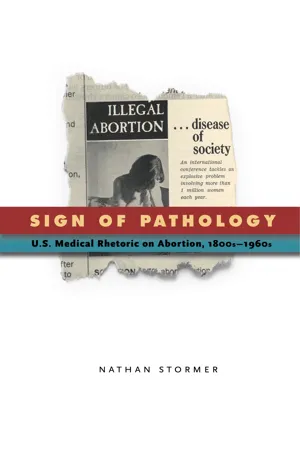
RSA Series in Transdisciplinary Rhetoric
U.S. Medical Rhetoric on Abortion, 1800s–1960s
- English
- PDF
- Available on iOS & Android
RSA Series in Transdisciplinary Rhetoric
U.S. Medical Rhetoric on Abortion, 1800s–1960s
About This Book
Much of the political polarization that grips the United States is rooted in the so-called culture wars, and no topic defines this conflict better than the often contentious and sometimes violent debate over abortion rights. In Sign of Pathology, Nathan Stormer reframes our understanding of this conflict by examining the medical literature on abortion from the 1800s to the 1960s.
Often framed as an argument over a right to choose versus a right to life, our current understanding of this conflict is as a contest over who has the better position on reproductive biology. Against this view, Sign of Pathology argues that, as it became a medical problem, abortion also became a template, more generally, for struggling with how to live—far exceeding discussions of the merits of providing abortions or how to care for patients. Abortion practices (and all the legal, moral, and ideological entanglements thereof) have rested firmly at the center of debate over many fundamental institutions and concepts—namely, the individual, the family, the state, human rights, and, indeed, the human. Medical rhetoric, then, was decisive in cultivating abortion as a mode of cultural critique, even weaponizing it for discursive conflict on these important subjects, although the goal of the medical practice of abortion has never been to establish this kind of struggle. Stormer argues that the medical discourse of abortion physicians transformed the state of abortion into an indicator that the culture was ill, attacking itself during and through pregnancy in a wrongheaded attempt to cope with reproduction.
Frequently asked questions
Information
Table of contents
- COVER Front
- Series Page
- Copyright Page
- Table of Contents
- Acknowledgments
- Introduction: Struggling Through Life
- Notes to Introduction
- Part I
- Chapter 1: When Abortion Became a Political-Economic Problem
- Notes to Chapter 1
- Chapter 2; Remembering, Forgetting, and the Secrets of Life
- Notes to Chapter 2
- Part II
- Chapter 3: “White Man’s Plague”: Anti-Malthusian Memory Work at the Fin de Siècle
- Notes to Chapter 3
- Chapter 4: “More Wisdom in Living”: Neo-Malthusian Memory Work at Midcentury
- Notes to Chapter 4
- Chapter 5: “The Lesser of Threatened Evils”: Therapeutic Amnesias
- Notes to Chapter 5
- Conclusion: Seeking Immunity
- Bibliography
- Index
- Untitled
- Notes to Conclusion